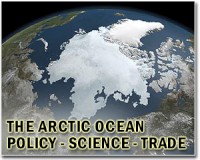| . |  |
. |
Newport, Rhode Island (AFP) Oct 7, 2009 International piracy and the challenges of new Arctic Ocean corridors opening up as a result of global warming topped the agenda Wednesday at a gathering of world maritime powers. "The menaces from climate change cause growing concern," warned Secretary of the Navy Ray Mabus. "There is a global security implication of the climate change." "The North West passage will be open most part of the year, the new generation of naval students will live in a different world," he said. A total of 101 countries are attending the 19th International Seapower Symposium, a three-day meeting occurring every two years, which aims to increase trust and confidence among naval leaders from around the world. "At a time of great challenge, our task is to see how our mutual efforts can safeguard peace and security in the 21st century," US Navy Commander Admiral Gary Roughead said in his opening remarks. Mabus agreed, adding: "Our navies increasingly think in terms of joint operations, and meet their counterparts in South America, Europe or Africa to combat the world maritime challenges." He cited piracy as just one example, as well as joint drug-trafficking operations and medical missions. The conference, which had its start in 1969 during the Cold War, is being held at the Naval War College a school of higher learning for naval officers based in this seaport town. Mabus also praised an increasing spirit of maritime cooperation that led even countries that have been combatants in the recent past -- like Russia and Georgia -- to attend the international summit. In a video message to the gathering, US Secretary of State Hillary Clinton also stressed the importance of international cooperation in confronting current maritime challenges and in forging greater maritime security, declaring that "no one nation has the capacity to meet these challenges alone." Roughead said cross-border cooperation was more in evidence in the international fight against piracy -- particularly off the coast of Somalia, which over the past few years has become a hotbed of international hijacking and high sea robbery. "In the Gulf of Aden, 20 nations are participating -- not only the navies but the aircrafts, and the prosecutors," he said. He was speaking as the French military said Somali pirates had attempted to storm the French navy's 18,000 tons flagship in the Indian Ocean after mistaking it for a cargo vessel. The crew of La Somme, a 160-meter (525-foot) command vessel and fuel tanker, easily saw off the brazen night-time assault by lightly armed fighters on two lightweight skiffs and captured five pirates, a spokesman said. Other issues highlighted at the gathering included the fight against international arms smuggling and the global effort to protect fisheries. Mabus also praised international efforts "to locate and destroy illegal narcotics in South America and Europe" as well as efforts in many southeast Asian countries to fight natural disasters. China and Libya which were both invited to attend the conference had declined to come, while Roughead confirmed that Iran had not been asked to participate. But Russia, Cambodia, Vietnam, the Maldives and Guyana were all taking part for the first time. Climate change has jumped to the top of this year's agenda now that global warming has opened up to exploration water channels that had been frozen solid. The conference takes place as Russia prepare to open up waters north of Siberia for exploration with major oil companies. Weather scientists have predicted the Arctic Ocean could be ice-free in the summer as early as 2015 providing new access to wealth of as yet untapped natural resources and coveted marine shipping routes through the Arctic. Share This Article With Planet Earth
Related Links Beyond the Ice Age
 NATO chief warns of climate change security risks
NATO chief warns of climate change security risksLondon (AFP) Oct 1, 2009 Climate change has "potentially huge security implications" and NATO countries should use the alliance as a forum to address the challenges it creates, the new NATO chief said Thursday. Rising sea levels, droughts and falling food production could spark large population movements and conflict, while the melting of Arctic ice risked inflaming tensions in the region, Secretary General Anders ... read more |
|
| The content herein, unless otherwise known to be public domain, are Copyright 1995-2009 - SpaceDaily. AFP and UPI Wire Stories are copyright Agence France-Presse and United Press International. ESA Portal Reports are copyright European Space Agency. All NASA sourced material is public domain. Additional copyrights may apply in whole or part to other bona fide parties. Advertising does not imply endorsement,agreement or approval of any opinions, statements or information provided by SpaceDaily on any Web page published or hosted by SpaceDaily. Privacy Statement |